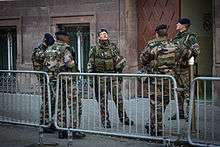Opération Sentinelle
Opération Sentinelle (English: Operation Sentinel) is a French military operation with 10,000 soldiers and 4,700 police and gendarmes deployed[1] since the aftermath of the January 2015 Île-de-France attacks, with the objective of protecting sensitive "points" of the territory from terrorism. It was reinforced during the November 2015 Paris attacks, and is part of an ongoing state of emergency in France due to continued terror threats and attacks.[2][3]
| Opération Sentinelle | |
|---|---|
| Part of Vigipirate | |
 An Operation Sentinelle logo used in French military vehicles | |
| Location | |
| Planned by | Ministry of Defence |
| Objective | Dealing with the terrorist threat and protect the sensitive "points" on land |
| Date | 12 January 2015 – present |
Background

Opération Sentinelle was first deployed after the January 2015 Île-de-France attacks, and was reinforced following the November 2015 Paris attacks, attacks which were claimed to have been perpetrated by the Islamic extremist groups Al-Qaeda in the Arabian Peninsula and Islamic State of Iraq and the Levant (ISIL). A number of other attacks have taken place in France since these attacks.[3]
Other European countries have also deployed soldiers to protect certain areas due to terror threats or attacks, including in Belgium,[4] Italy,[5] and the United Kingdom.[6]
Attacks against soldiers
On at least six occasions, soldiers involved in the nationwide operation have themselves been targeted.[3]
Soldiers deployed under Opération Sentinelle on 3 February 2017 blocked the assailant in the Louvre machete attack from entering the museum, where he claims to have intended to deface art with spray paint as a symbolic attack on France; he attacked the patrolling soldiers with a machete.[7]
In the March 2017 Île-de-France attacks, two Opération Sentinelle soldiers at Orly Airport killed a man who said "I am here to die for Allah"[8] while he beat to the floor another member of their team, a soldier from whom the attacker intended to steal her assault rifle.
On 9 August 2017 in Levallois-Perret, six soldiers of the 35th Infantry Regiment[9] participating in Opération Sentinelle were intentionally wounded by an automobile whose driver fled.[10] The military did not have time to use their weapons.[11]
See also
- Operation Vigilant Guardian—the Belgian army's equivalent.
- Operation Temperer—the British army equivalent.
References
- Willsher, Kim (9 August 2017). "French police search home of man suspected of driving into soldiers". The Guardian. ISSN 0261-3077. Retrieved 10 August 2017.
- "Suspect in hit-and-run on French soldiers unknown to spy agencies: source". Business Insider. Reuters. 10 August 2017.
- Patel-Carstairs, Sunita (9 August 2017). "Man held after terror attack on French soldiers". Sky News. Retrieved 9 August 2017.
- "Belgium deploys army as Europe remains on high alert". France24. 17 January 2015. Archived from the original on 11 July 2018. Retrieved 19 August 2017.
- "Italy deploys soldiers to guard against terror attacks". Reuters. 18 February 2015. Retrieved 23 May 2017.
- "What is Operation Temperer: Theresa May becomes first PM to deploy up to 5,000 soldiers on streets". The Telegraph. Retrieved 25 May 2017.
- Rios, Michael (3 February 2017). "2017Louvre Museum attacker in life-threatening condition, French prosecutor says". PBS NewsHour. Retrieved 14 February 2017.
- "Last words of Paris attacker: I am here to die for Allah". CBC.
- "Militaires renversés à Levallois: un suspect interpellé". 9 August 2017 – via www.la-croix.com.
- "Militaires blessés à Levallois-Perret : le suspect identifié". 9 August 2017 – via www.la-croix.com.
- "Attaque contre des militaires à Levallois-Perret : Emmanuel Macron félicite les "forces de l'ordre qui ont appréhendé l'auteur de l'attaque"". 9 August 2017.
External links
| Wikimedia Commons has media related to Opération Sentinelle. |
- Chrisafis, Angelique (15 April 2016). "Thousands of troops on Paris streets but are they France's new Maginot line?". The Guardian. Retrieved 14 February 2017.
- McAuley, James (4 June 2016). "In France, are soldiers outside the Eiffel Tower and the Louvre really worth it?". Washington Post. Retrieved 14 February 2017.